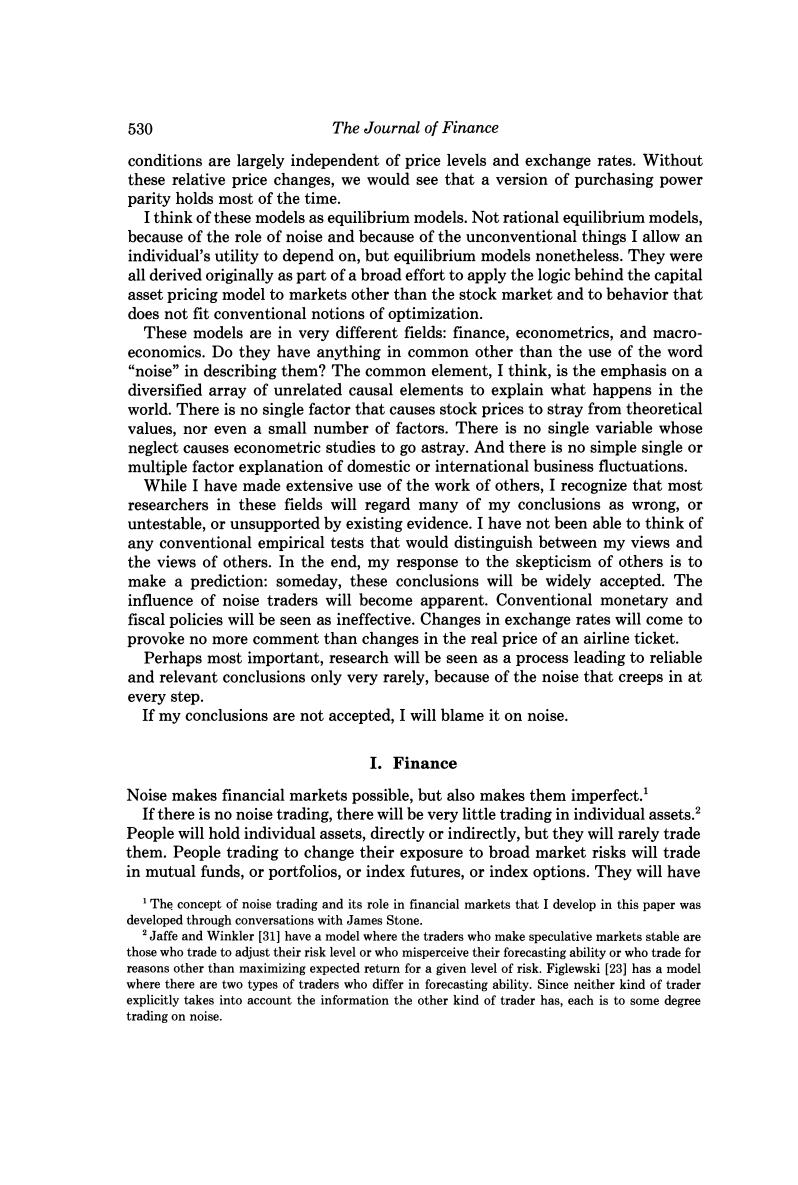正在加载图片...

530 The Journal of Finance conditions are largely independent of price levels and exchange rates.Without these relative price changes,we would see that a version of purchasing power parity holds most of the time. I think of these models as equilibrium models.Not rational equilibrium models, because of the role of noise and because of the unconventional things I allow an individual's utility to depend on,but equilibrium models nonetheless.They were all derived originally as part of a broad effort to apply the logic behind the capital asset pricing model to markets other than the stock market and to behavior that does not fit conventional notions of optimization. These models are in very different fields:finance,econometrics,and macro- economics.Do they have anything in common other than the use of the word "noise"in describing them?The common element,I think,is the emphasis on a diversified array of unrelated causal elements to explain what happens in the world.There is no single factor that causes stock prices to stray from theoretical values,nor even a small number of factors.There is no single variable whose neglect causes econometric studies to go astray.And there is no simple single or multiple factor explanation of domestic or international business fluctuations. While I have made extensive use of the work of others,I recognize that most researchers in these fields will regard many of my conclusions as wrong,or untestable,or unsupported by existing evidence.I have not been able to think of any conventional empirical tests that would distinguish between my views and the views of others.In the end,my response to the skepticism of others is to make a prediction:someday,these conclusions will be widely accepted.The influence of noise traders will become apparent.Conventional monetary and fiscal policies will be seen as ineffective.Changes in exchange rates will come to provoke no more comment than changes in the real price of an airline ticket. Perhaps most important,research will be seen as a process leading to reliable and relevant conclusions only very rarely,because of the noise that creeps in at every step. If my conclusions are not accepted,I will blame it on noise. I.Finance Noise makes financial markets possible,but also makes them imperfect. If there is no noise trading,there will be very little trading in individual assets.2 People will hold individual assets,directly or indirectly,but they will rarely trade them.People trading to change their exposure to broad market risks will trade in mutual funds,or portfolios,or index futures,or index options.They will have The concept of noise trading and its role in financial markets that I develop in this paper was developed through conversations with James Stone. 2 Jaffe and Winkler [31]have a model where the traders who make speculative markets stable are those who trade to adjust their risk level or who misperceive their forecasting ability or who trade for reasons other than maximizing expected return for a given level of risk.Figlewski [23]has a model where there are two types of traders who differ in forecasting ability.Since neither kind of trader explicitly takes into account the information the other kind of trader has,each is to some degree trading on noise